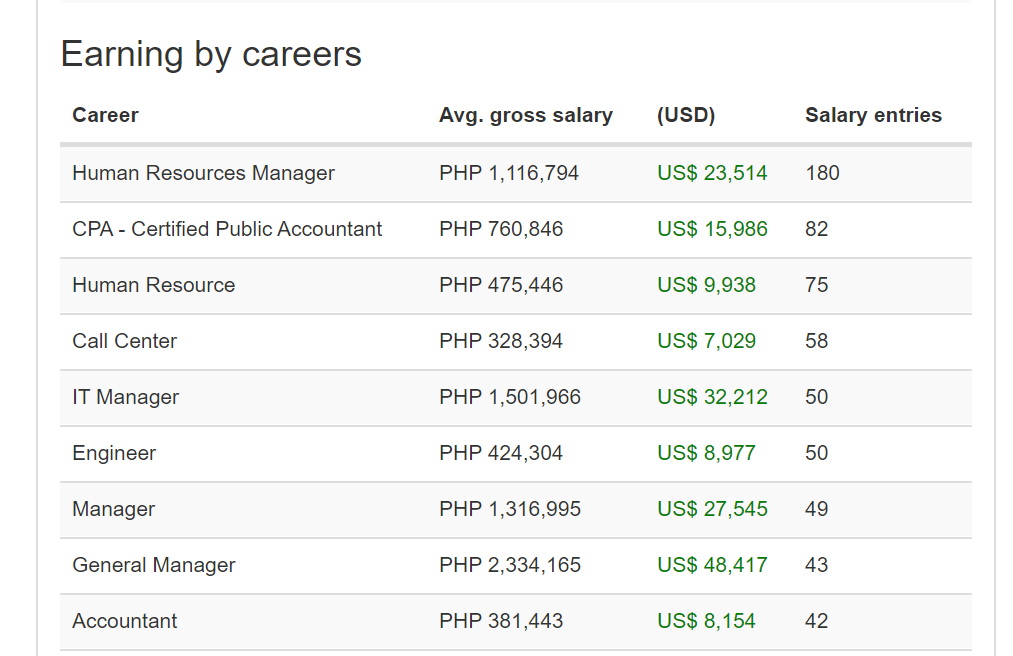There is a great need for talented human resource teams in the Philippines. Companies are constantly struggling to find talent, despite the growing population and thousands of Filipinos entering the workforce every year.
HR professionals are responsible for making sure the company runs smoothly in the face of any adversary, such as internal conflict. They navigate complicated benefits and make sure everything is in smooty working order, so your employees can focus on their jobs.
Below we list the average salaries in the HR field in the Philippines.
According to HR Nation, a HR assistant could earn 13,400 to 15,000 a month. A HR officer earns approximately 17,000 to 18,800 a month. A HR supervisor earns around 23,200 to 25,000 a month, and a HR manager typically earns 38,000 to 50,000 a month.
HR manager, the highest position in the HR department, commands an equally high salary. According to PayScale, “A Human Resources (HR) Manager earns an average salary of PHP 481,069 per year.” These managers typically oversee the direction and strategy of the HR department in relation to the overall goals of the business.
The typical skills progression of an HR assistant to manager looks something like this;
- Begin by doing low-level tasks such as filing, attendance monitoring, and other administrative tasks for the department. This is to learn the mechanics of how the department works on the first level.
- Once you understand more of the system, you begin managing files, handling recruitment tasks, and administration tasks that deal more with finances (such as salary and benefits).
- When you’ve gotten your feet wet with recruitment, you graduate to training and onboarding new employees. You deal more with high level strategy, such as goals and objectives of the company, and bring that into your work.
- Finally, at the top level you have the authority and experience to implement new programs, policies, guidelines and procedures for the company’s talent. You oversee the direction of the department, which leads the direction of recruitment, which leads the direction of the brand.
Factors that impact the HR salary
The numbers stated above are the average salaries that were calculated across the country in general. However, if one wants to learn more about the HR salary, it is important to consider a few factors that have a big impact on the salary of an HR specialist.
Company size
Many people believe that the bigger the company is, the bigger the salaries are. While this is true in some cases, this is not the ultimate rule.
A recent study revealed that non-managerial positions have higher chances for salary increases in companies with under 50 employees or companies with 750+ employees. Here is an explanation for that.
Small companies with 50 or fewer employees usually have only one or two HR specialists who are responsible for all HR-related processes (including recruitment). That’s why it’s often fair to pay them a high salary. Big companies, on the other hand, constantly grow and can afford to pay high salaries to their HR specialists.
As for HR managers, they should look for a salary increase in companies with 200-500 people. Such companies tend to display a steady growth pattern and therefore do not hesitate to raise wages for the managers that contribute to the company’s growth.
Responsibilities and skills
This is the most critical factor that impacts the future salary of an HR professional. The bigger the responsibility, the higher the salary.
Here are a few key roles in the HR department, starting with the least crucial.
- HR assistant: Typically assists HR specialists with minor tasks and helps to do routine work that does not require a high level of skill or experience
- HR specialist: This role usually implies tight communication with employees, conduction of interviews, surveys, and feedback, organization of events (if needed)
- Onboarding specialist: This person is responsible for all the processes related to onboarding,
- Compensations and benefits specialist: This specialist works only with employees’ compensations and benefits (the role is common in big companies with several offices)
- HR manager: oversees the work of the department, assigns tasks, proposes initiatives, ensures that the work process goes alongside the strategy
- HR director: comes up with the development strategy, manages the work of the department in a company, optimizes internal processes
However, these roles are often blurred or mixed depending on the company size and type. For example, in small companies, one specialist can combine the roles of an onboarding specialist, benefits and compensation specialist, and an HR manager.
Is the HR department really so important for a company?
According to this survey, HR managers have the highest average gross salary compared to other professionals.

While some do not understand the importance of the HR department, companies that wish to grow and develop fully embrace all the benefits that a well-structured HR department brings to a company.
Employee motivation and satisfaction
Employees are the driving force behind a high-quality product so their motivation and satisfaction should be the primary concern. And this is solely the responsibility of the HR department.
HR specialists take care of many processes that are related to employees’ motivation and satisfaction: conduction of surveys, personal talks, interviews, collection of feedback, the introduction of new practices, organization of events within a company.
All these processes aim to bring additional value to employees and strengthen the bond between them and a company. And motivated employees tend to display much better results than unmotivated ones.
Finding the best talent
HR specialists are the ones who provide the most suitable talent for a company and ensure that the candidates match the required tasks.
There are several aspects to keep in mind when choosing a perfect candidate for a position, and the primary ones are technical and soft skills. Experienced HR professionals invest a significant amount of time and resources to search through hundreds of resumes and select those candidates that seem the best fit.
In addition, HR specialists are responsible not only for finding talent but recruiting and retaining them. It takes a certain set of skills like communication and negotiation to persuade the candidate to accept the offer and make sure s/he will not leave after some time. So we can assume that HR specialists help the company grow by providing it with talented and enthusiastic people.
Budget management
One more important function that HR specialists perform is assistance with budget management. Since HR specialists manage employee benefits, compensations, and similar expenses, they can always adjust the company’s budget and negotiate the best rates.
As well, they constantly monitor the tendencies and trends in salaries across the industry and can always inform the company’s owner on whether the salary is calculated fairly. This function of the HR department is especially beneficial for small companies that do not have many specialists dealing with finances.




